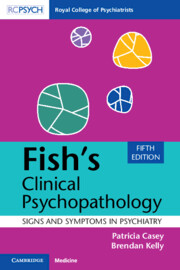Book contents
- Fish’s Clinical Psychopathology
- Fish’s Clinical Psychopathology
- Copyright page
- Contents
- Preface
- 1 Classification of Psychiatric Disorders
- 2 What Is Psychopathology?
- 3 Disorders of Perception
- 4 Disorders of Thought and Speech
- 5 Disorders of Memory
- 6 Disorders of Emotion
- 7 Disorders of the Experience of Self
- 8 Motor Disorders
- 9 Disorders of Consciousness
- 10 Personality Disorders
- Book part
- Index
- References
5 - Disorders of Memory
Published online by Cambridge University Press: 12 January 2024
- Fish’s Clinical Psychopathology
- Fish’s Clinical Psychopathology
- Copyright page
- Contents
- Preface
- 1 Classification of Psychiatric Disorders
- 2 What Is Psychopathology?
- 3 Disorders of Perception
- 4 Disorders of Thought and Speech
- 5 Disorders of Memory
- 6 Disorders of Emotion
- 7 Disorders of the Experience of Self
- 8 Motor Disorders
- 9 Disorders of Consciousness
- 10 Personality Disorders
- Book part
- Index
- References
Summary
Memory is of three types: sensory, short term and long term. It can be compared to a sieve with holes of varying sizes to assist in separating material that is relevant from that which is irrelevant. The first type of memory, sensory memory, is registered for each of the senses and its purpose is to facilitate the rapid processing of incoming stimuli so that comparisons can be made with material already stored in short- and long-term memory. Since there are numerous stimuli bombarding the individual, selective attention allows for the sifting of relevant material from sensory memory for further processing and storage in short-term memory. As a consequence, most sensory memories fade within a few seconds. Short-term memory, also called working memory, allows for the storage of memories for much longer than the few seconds available to sensory memory. Short-term memory aids the constant updating of one’s surroundings.
- Type
- Chapter
- Information
- Fish's Clinical PsychopathologySigns and Symptoms in Psychiatry, pp. 63 - 70Publisher: Cambridge University PressPrint publication year: 2024



